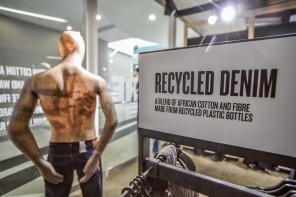H&M, shortly after launching its Conscious Collection, is once again showing an interest in sustainable fashion by offering consumers discount vouchers for dropping off their old clothes in store.
H&M, which won notoriety three years ago when some of its unsold inventory was shredded and left for trash on a New York City street, says the initiative will limit waste in the fast- fashion industry the company helped spawn.
The program started in February and will be in all of H&M’s 2,900 outlets by yearend. It may bolster the company’s image as fallout from the Bangladesh factory collapse in April weighs on the garment industry, and it will help attract shoppers while H&M struggles to increase revenue. “
The Swedish retailer collects clothing of any brand and in any condition in white and green boxes in stores. Switzerland’s I:Collect AG buys the garments and, depending on quality, either resells them or gives them new life in things like cleaning cloths and stuffed toys.
“We don’t want clothes to become waste, we want them to become a resource instead,” H&M sustainability manager Henrik Lampa said in the retailer’s headquarters overlooking Drottninggatan, a busy shopping street in Stockholm. “We want to make new commercial fibers out of this, to make new clothes and textiles.”
Sustainable Fashion?
Our question is this, how sustainable is this “solution” really? If you are giving consumers discount vouchers to spend in your store on buying even more fast-fashion items then aren’t you just enabling the problem and nullifying the “green effect”? If sustainability if the message then shouldn’t retailers be encouraging consumers to buy less, more expensive items as Vivienne Westwood recently stated. At least this way they will still be attending to the bottom line while contributing towards sustainable fashion.
Recycling Research
According to reports, H&M is investing the bulk of the proceeds it gets from selling garments to I:Collect in research on recycling textile fibers, though it declined to say how much those investments amount to. While some new recycling techniques appear promising, it will be a half-decade or so before they’ll have a measurable effect, said sustainability chief Lampa.
“We can’t just sit and wait for the technology to take off,” Lampa said. “We believe we have a role to play.”
What do you think? Is this a step forward for sustainable fashion or a green washed attempt to increase revenue for retailers?











